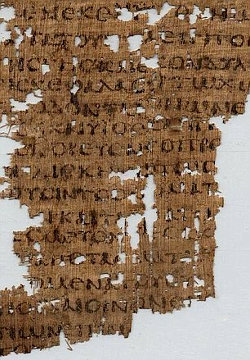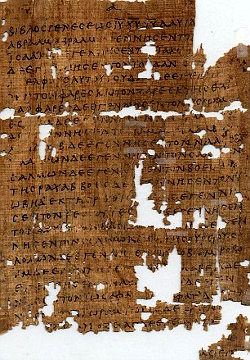Moses - the Tragedy
When Bernad Grenfell and Arthur Hunt went out to Egypt they were deliberately looking for ancient texts. They knew that Aristotle's Constitution of Athens had been discovered six years earlier in 1890 and, as classical scholars, they hoped to discover many more "lost works" by ancient Greek authors.
With this in mind, they deliberately chose a little-known town in Upper Egypt that they knew, from other literary sources, had been inhabited during the Greek period but which was not an important site from the point of view of ancient, pharaonic, Egypt. The site of Oxyrhyncus fitted their requirements perfectly.
It had been the capital of the 19th nome and was dedicated to the medjed, a species of elephantfish which the ancient Egyptians blamed for having eaten Osiris' penis and thus prevented him returning fully to the land of the living. When the Ptolemies took over in Egypt they re-established the town and gave it the Greek name "Oxyrhynkhoupolis", town of the sharp-nosed fish. It quickly grew to be the third-largest city in Egypt.
For Grenfell and Hunt the town had another important advantage. It was not situated on the Nile, but on the great Bahr Yusuf canal. This meant that it was above the annual flooding of the Nile and so whatever was to be found in the ruins had not been destroyed by water damage - for rain is negligible in Upper Egypt. Even better, when the Muslims took over in Egypt, as happened all across north Africa they neglected or vandalised the works of their predecessors and when the canal system ceased to operate, not only did Oxyrhyncus wither and die, but any possible source of water damage disappeared as well.
From the work of previous archaeologists in Egypt, Grenfell and Hunt knew that the rubbish dumps rather than the houses were likely to be the most productive areas and they headed straight for the mounds of sand that dotted the desert around the town. "My first impressions on examining the site were not very favourable," Grenfell later wrote. "The rubbish mounds were nothing but rubbish mounds."
First impressions, however, are not always reliable and on digging into the mounds they soon found that they had uncovered a treasure trove. Grenfell later corrected his initial report by saying, "The flow of papyri soon became a torrent. Merely turning up the soil with one's boot would frequently disclose a layer" [of papyrii]. It has been estimated that more than 70% of all the ancient Greek papyrii so far discovered have come from the work by Grenfell and Hunt and their successors at Oxyrhyncus.
To their disappointment, however, only about one in ten of the documents they found was ancient Greek literature. The overwhelming majority was stuff in which they were not interested - schoolboy exercises, tax receipts, bills for merchandise, letters from absent fathers, census accounts and many more. It took a while for them to realise that these documents were at least as important as the literary works for which they were looking. Thanks to all this secondary material we now have a vivid picture of daily life in a Greek city, one which we could never gain from excavating the stones of its buildings.
The two men devoted the rest of their lives to translating the horde of documents they had discovered. Grenfell died in 1926 and was followed eight years later by Hunt. Since then the work of piecing together, editing and translating the papyrii fragments has been continued by Oxford University. Seventy-five large volumes have been published so far and the volume of work remaining is so large that the university has hit upon the idea of "crowd sourcing" to try to complete the task within a reasonable time. Dr Chris Lintott of Oxford University estimates that so far only 2% of the material has been translated!
One reason for this is that the majority of documents are only fragments - some half a million of them! Unfortunately Grenfell and Hunt paid their workers by the piece, so the greedy fellahin naturally ripped up any large scrolls they discovered in order to increase the reward they received. Piecing all these fragments together is a monumental task, not helped by the fact that after Grenfell and Hunt left the site the Italians worked on it for another quarter of a century and many of the fragments the Englishmen discovered have matching parts in Italy!

| |
| The writing forms an ancient "captcha", for the damaged letters are beyond the capabilities of any computer recognition program. |
If you would like to help in this task, visit the Ancient Lives website and have a go. Obviously if you are an expert in ancient Greek and can translate what you see, so much the better, but even if you know not a letter of Greek, you can still help to match one fragment with another just as you would put together a jigsaw - by shape, colour and matching lines (in this case, letters).
You can also help to transcribe the fragments - that is, write down the letters. Again, you do not need to know any Greek (though such knowledge would be a help), but transcription of these ancient documents is a task beyond the abilities of a computer. Ink has faded or chipped off and worn away as the document experienced various vicissitudes, insects or wear have resulted in holes through some of the letters. The documents are, in fact, an enormous "captcha" - those annoying characters in various sizes, fonts and covered by random dots which are supposed to ensure that it really is you trying to log-in to your bank account.
Eusebius, the church historian, casually mentions that a certain Ezekiel (not the Biblical prophet of that name!) wrote a version of the Exodus story in iambic trimeters. Ezekiel's work was so uninspiring that it soon disappeared and no one was even sure whether Eusebius was telling the truth or nor - it could have been something he heard about and misunderstood.

| |
| Part of a document from Oxyrhyncus, a play on the life of Moses in iambic trimeters by a little-known author called Ezekiel. |
To the delight of Dr Dirk Oddbink, coordinator of the crowd-sourcing project, it appears that Ezekiel's work has been discovered - or if not Ezekiel's, then something very like it. Unfortunately it is only a fragment, but it includes a speech by Moses in which he tells the story of his early life. Here is a translation of part of that speech:
Then the princess with her maidservants came down to bathe.
When she saw me, she took me up and recognised that I was a Hebrew.
My sister Mariam then ran up to her and spoke,
"Shall I get a nursemaid for this child from the Hebrews?" The princess urged her on.
Mariam went to fetch our mother who presently appeared and took me in her arms.
The princess said to her, "Woman, nurse this child and I shall pay your wages."
She then named me Moses, because she had taken me from the watery river-bank.
It would appear that Ezekiel's work was, in fact, a play written in the style of a Greek tragedy. Not enough remains for us to tell exactly how the story worked out as a tragedy - perhaps it is pharaoh who is the hero or villain of the piece and the subject of the tragedy, or perhaps it is Moses' failure to enter the Promised Land which forms the tragedy. We know that Egypt had a large Jewish population and presumably they could be counted on to fill the theatres wherever this play was performed.
What is interesting to me is that Moses attributes his name to "because she had taken me from the watery river-bank". Scholars have long recognised that "moses" is an Egyptian name and forms part of royal names such as Tutmoses, Ramoses (Rameses) and so on. The word means "drawn out from" and just as the kings were "drawn out" of the god Thoth or Ra. so Moses was almost certainly drawn out of some Egyptian god which Jewish piety quickly dropped.
Here at Digging Up the Past we have, for many years, suggested that the original name of the great Jewish legislator was almost certainly Hapi-moses, for Hapi is the god of the Nile and what more natural than that the squalling infant, rescued from death in the Nile, should be named "drawn out of Hapi".
medjed The town was called Per-Medjed, the "house of Medjed". The title of the Egyptian kings has a similar derivation, for "per-o" means "the great house" and came to be identified as the Egyptian ruler in the same way as we might today report that "the White House said ..." or "the White House issued a statement ..." Return
Osiris' penisAccording to the rather complicated myth of Osiris, he was the rightful king of Egypt but was killed by his envious brother Set, who inveigled him into a chest which was then closed and dropped in the river. It washed up on a small islet in the delta and was there discovered by Osiris' grieving wife, Isis. By her magic arts she managed to bring him back to life and became pregnant by him, but one day Set discovered the body (presumably temporarily moribund again) and chopped it into multiple pieces and scattered them all over the land of Egypt. Isis went in search of the pieces and found one in each of the nomes or provinces of Egypt, all except the most vital part of all, which had been eaten by the medjed. As a result Osiris was not able to return to the land of the living and became instead ruler of the Underworld. Return
works of their predecessors As we see in Iraq, Syria and elsewhere where Muslim fundamentalists have gained control, Islam is offended by the fact that those without the Qur'an have achieved great things. Rather than try to surpass them - too much like hard work - the Muslims try to remove all memory of former greatness by destroying it. Return
© Kendall K. Down 2016





